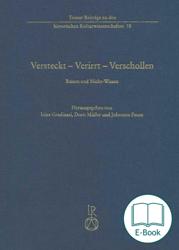Since the Early Modern Period, traveling becomes a central strategy enhancing knowledge. At the same time, travel seems to deliver a gateway for the incalculable and unfathomable. Contributions to this addition seek to explore how this type of non-knowledge appears in travelogues and travel fiction in literature, film, and art. Those investigations can show the aesthetic and epistemic dimensions of non-knowledge. As travel is conceptualized both as a medium and a poetical figure reflecting upon knowledge processes this publication will enrich the discussions on theory of knowledge as well as on travel writing.
The present addition observes the intricate connection between travel and non-knowledge in travel writing, film, and art. At the latest, by the Early Modern Period, traveling becomes not just a central strategy acquiring, authorizing, and questioning knowledge but also a gateway of non-knowledge. Though, the theoretical or practical frontier crossing into the unknown confronts travelers with experiences which cannot be integrated into existing registers of knowledge. The ways of dealing with this non-knowledge are manifold. It can be identified as own ignorance or as foreign, incomprehensible ‘other’ knowledge which is explicitly excluded. It can take shape as aesthetic and mystical experience in works of art and literature or it can be processed as unfathomable and traumatic incident revealed between the lines.
Representing non-knowledge is highly dependent on the kind of the respective travel and media, genres and aesthetics of travel depictions. The contribution seek to give space to this nexus: Subject of investigation are travelogues and travel fiction, maps and expedition films, feature films and paintings, as well as video art, and postcards of travelers. Further more the articles focus on different forms of travel. They analyze journeys of exploration whose protagonists are on the search for the New World, treasures, adventures, or confirmation of their scientific presumptions and on the way discovering unexpectedly ‘other’ knowledge, getting lost, or missing. They also deal with the figure of the vagabond for whom traveling becomes an end in itself or an experiment for gaining new experiences and aesthetic practices to express non-knowledge. Further contributions are occupied with pathfinders who take a fresh look from afar onto the already known to uncover hidden connections. They might be entangled against their will into crime investigations or have a war-related need to travel.
As this publication conceptualizes travel as both a medium and a poetical figure reflecting upon knowledge processes it will enrich the discussions on the theory of (non)-knowledge as well as on travel writing.
„Der Band ist [...] wirklich empfehlenswert. Vorliegendes Buch ist definitiv eine Bereicherung auf dem Feld der Thematisierung von Reiseliteraturen. Zahlreiche Abbildungen [...] erhöhen überdies das Lesevergügen.“
Von: Jörg Füllgrabe
In: literaturkritik.de, Nr. 4, April 2017. Online unter:
http://literaturkritik.de/public/rezension.php?rez_id=23135
Irina Gradinari is research fellow at the Institut für Kulturwissenschaft (Institute for Cultural History and Theory) at Humboldt-Universität Berlin. From 2010-2013 she worked as an assistant fellow at the German Department at University Trier. Her current research project aims to investigate memory politics in West/East German as well as Russian war films on the Second World War.
Selected publications: I. G.: Genre, Gender und Lustmord. Mörderische Geschlechterfantasien in der deutschsprachigen Gegenwartsprosa, Bielefeld 2011; I. G. et al. (eds.): Geschlechter-Szene. Repräsentation von Gender in Literatur, Film, Performance und Theater, Freiburg 2010; I. G. et al. (eds.): Verbrechen – Fiktion – Vermarktung. Gewalt in den zeitgenössischen slavischen Literaturen, Potsdam 2013; I. G./ Höltgen, Stefan (eds.): Heiße Drähte. Medien im Kalten Krieg, Bochum 2014. Dies./Müller, Dorit/Pause, Johannes (eds.): Wissensraum Film, Wiesbaden 2014.
Dorit Müller is research fellow with the Emmy Noether Research Group Bauformen der Imagination. Literatur und Architektur in der Moderne (Building Formations of Imagination. Literature and Architecture in Modernity) at Freie Universität Berlin. From 2011-2013 she worked as postdoctoral fellow at the Research Center for Historical and Cultural Studies at Trier University. She is currently investigating architectures of knowledge in literature and visual media using historical examples of Arctic research and polar fiction.
Selected publications: D. M.: Gefährliche Fahrten. Das Automobil in Literatur und Film um 1900, Würzburg 2004;
D. M./Boden, Petra (eds.): Populäres Wissen im medialen Wandel, Berlin 2009; D. M./Scholz, Sebastian (eds.): Raum, Wissen, Medien. Zur raumtheoretischen Reformulierung des Medienbegriffs, Bielefeld 2012; D. M./Weber, Julia (eds.): Die Räume der Literatur. Exemplarische Zugänge zu Kafkas Erzählung „Der Bau“, Berlin 2013; D.M,/Gradinari, Irina/Pause, Johannes (eds.): Wissensraum Film, Wiesbaden 2014.
Johannes Pause is research fellow with the ERC-Project „The Principle of Disruption“ at Technical University of Dresden. From 2009-2014 he worked as postdoctoral fellow at the Research Center for Historical and Cultural Studies at Trier University. In his most recent project he is studying political cinema from the 1960s to the years 2000.
Selected publications: J. P.: Texturen der Zeit. Zum Wandel ästhetischer Zeitkonzepte in der deutschsprachigen Gegenwartsliteratur, Köln 2012; J. P./ Nanz, Tobias (eds.): Das Undenkbare filmen. Atomkrieg im Kino, Bielefeld 2013; J. P./Gradinari, Irina/Müller, Dorit (eds.): Wissensraum Film, Wiesbaden 2014; J. P./Nanz, Tobias (eds.): Politiken des Ereignisses. Mediale Formierungen von Vergangenheit und Zukunft, Bielefeld 2015.
The new publication series entitled “Trierer Beiträge zu den historischen Kulturwissenschaften” (Trier Papers in Historical Cultural Studies) aims at being a forum for papers in the area of Cultural Studies, which focus on historical and interdisciplinary research. In addition to essay collections and conference proceedings, the series also covers monographic studies as well as exhibition catalogues.
The editor of the book series is the Executive Board of the “Historisch-Kulturwissenschaftliche Forschungszentrum” (HKFZ) Trier (Trier Historical Cultural Research Centre) at Trier University. The Research Centre is financed in line with the research initiative of Rhineland-Palatinate. The HKFZ’s current research topic is called “Räume des Wissens – Orte, Ordnungen, Oszillationen” (“Spaces of Knowledge – Places, Orders, Oscillations”). In collaboration with national and international partners, groups of linked projects work on this topic at Trier University.


 Table of Contents
Table of Contents